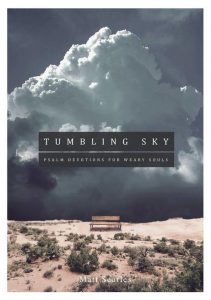All posts by Jon Gemmell
Proclaimer Blog
Music from Women in Ministry 2018
There were many requests regarding the songs that we sung at WiM ’18. Below find a list of all the songs from all the main sessions
Monday (5pm)
Who has held the oceans in his hands (Behold our God) | Who O Lord could save themselves (You alone can rescue) | Jesus let me meet you in your word (Now in reverence and awe) | In Christ Alone
Monday (8pm)
Come people of the Risen King | Make the book live to me | Come thou fount of every blessing | Praise my soul the King of Heaven
Tuesday (morn)
Blessed be your name (Blessed be the name of the Lord) | My soul finds rest | When I was lost (There is a new song) | Your glorious cause (Let your Kingdom come)
Tuesday (eve)
The splendour of the King | To God be the glory | There is a hope (that burns within my heart)
Wednesday (morn)
Crown him with many crowns | Jerusalem (See Him in Jerusalem) | Prepare our heart O God | Psalm 45 – O King you are most worthy (Matt Searles Lyrics, to the tune Thaxted – I vow to thee my country)
Thursday (morn)
Before the throne of God above | I once was lost in darkest night (All I have is Christ) | Be thou my vision
We hope that this is helpful…
Proclaimer Blog
Wednesday is for Women’s Ministry (Part 3)

Carrie Sandom is the Director of Women’s Ministry at The Proclamation Trust. I asked her a few questions about Women’s Ministry.
Here is part 3 of our 4 part series, Wednesday is for Women’s Ministry.
What fruit is borne through Biblical Women’s Ministry in the life of the church?
Titus 2 is clear that where this kind of ministry is NOT happening, we malign God’s Word. I take that to mean that a healthy local church will have discipleship programmes running for men and women and we adorn the gospel of grace and make it attractive when we make these a priority.

Men and women are equal in status, dignity and humanity – so why wouldn’t we take the discipleship of women as seriously as we do the discipleship of men. People have often said to me over the years that it’s a real shame that I “only” teach women but by saying this they show they do not value women or women’s ministry as much as men. This kind of inherent misogyny is rightly being challenged in our culture and the church should be leading the way in addressing the unhealthy attitudes that prevail. We malign God’s Word and the gospel of grace if we don’t.
How could a church wanting to expand and develop women’s ministry set about finding someone to fill a ministry role?
There is a growing network of women involved in ministry – either because they have done Cornhill or attend the Women in Ministry conference (or both). Evangelicals Now and the Hub are good places to advertise for jobs but it’s also worth contacting the PT office as we often know who’s looking for a job/coming to the end of their current contract.
How do you ensure women’s ministry is not the thin end of the egalitarian wedge?
I think some churches do fear this but I think doing nothing is more likely to exasperate the women in your church! Once women have a taste of what women to women ministry involves it can help them to feel valued and that they have a role to play in the life of the church. It’s helpful if the men in leadership are aware of and affirm what they’re doing and show people what an integral part of the church’s life and witness it is. But running a women’s ministry doesn’t mean I’m going to get into the pulpit! At some point the church will need to be taught about the roles of men and women in the family and the church (but not endlessly) – and then to get on and model the unique roles that men and women have.
How do you ensure that others on the pastoral team understand and support you in your role?
There needs to be good communication about what women’s ministry is and what it’s not – not just amongst the staff team but the wider church as well! The aims of the women’s ministry at St John’s are exactly the same as the aims of the church as a whole – to know Jesus better and to make Him better known. It is a Bible teaching ministry, where we let the Bible set the agenda (studying whole books at a time in the women’s Bible study groups) and not an issue based ministry (seeking to solve people’s problems). As such it is no different to what the youth worker is trying to do with the youth, the men’s worker is trying to do with the men or the preachers are trying to do with the whole church when we gather together on a Sunday.

Proclaimer Blog
Preacher’s Profile Vaughan Roberts
This is the fourth in our Preachers Profile Series. This time we asked Vaughan Roberts questions about his life and preaching ministry.

 Vaughan Roberts studied law at Cambridge University before a brief spell in South Africa where he was involved in student ministry. He subsequently trained for Anglican ministry at Wycliffe Hall, Oxford, and since 1991 he has been on the staff of St Ebbe’s Church, Oxford, where he is now Rector. Vaughan is Chairman of The Proclamation Trust.
Vaughan Roberts studied law at Cambridge University before a brief spell in South Africa where he was involved in student ministry. He subsequently trained for Anglican ministry at Wycliffe Hall, Oxford, and since 1991 he has been on the staff of St Ebbe’s Church, Oxford, where he is now Rector. Vaughan is Chairman of The Proclamation Trust.
1) When did you preach your first sermon and how long have you been preaching?
My first sermon was in my second year as an undergraduate at Cambridge when I spoke to a very small congregation consisting of about 10 elderly people. It was on Genesis 12, a key passage for biblical theology – but I completely missed that point. I was on crutches after a football injury and had to sit to speak, which made it even harder to engage the congregation and keep them awake. I failed! That was in 1986, so I’ve been preaching for over 30 years.
2) What was your journey to preaching ministry?
As a very young Christian I was given tapes of Dick Lucas on Colossians. I had never heard of him at the time, having no experience of evangelical churches, but I found them electric and remember thinking: I’d love to give my life to preach the Bible like that. But I was very shy as a teenager and didn’t think that I would ever be given opportunities to speak in public. But within a couple of years I was asked to give talks to school Christian groups and at camps for teenagers. That’s a great context in which to learn to speak, as you have to work hard to engage them – teenagers make little effort to hide it if they are bored. It was in these early days that I was encouraged towards Anglican ordination. I had a great year doing student ministry in South Africa straight after university, where I had lots of opportunities to preach. I then went to train at Wycliffe Hall in Oxford and I have been in the city, and at St Ebbe’s church, ever since.
3) Describe the congregation/setting you regularly preach to.
St Ebbe’s is in the heart of Oxford, surrounded by shops, university buildings and a small residential area. There are four congregations on Sundays, all of which have a slightly different feel. 9.45 has all ages from across the city, including many children (who are in children’s groups for the sermon). The 11.45 meets only during university term and is mostly students from many different countries. 4.30 focuses on non-bookish Oxford locals. 6.30 is again quite mixed: young adults, teenagers, students and some long-term church members. I am only occasionally at the 4.30, but preach regularly at the other congregations. I typically preach at one or two of them each week, with different team members on at the others. I also preach quite regularly at conferences and conventions away from home.
4) What are you currently preaching on/through?
I am about to resume a series on Galatians. I started it to coincide with the Reformation anniversary, when I preached on chapters 1-3. I am about to preach on the remaining chapters in the next few weeks.
5) What is your regular rhythm of sermon preparation, your usual process and how you schedule it in during the week?
I am privileged to work for a church that values preaching, knows it takes time to prepare and encourages me to give priority to this, but even then it’s a battle to find adequate time every week. I make sure I block out at least three periods of 2-3 hours between Monday and Thursday, starting as early in the week as I can – that gives much needed percolation time.
I begin by focusing on the big picture of the passage, trying to answer the question: what is this for – what is it designed to do? It’s not my task to inject momentum into a passage – I am aiming to discover the momentum that is already there. No part of scripture just teaches truths for the sake of it. Each has an aim/a purpose. I am trying to discover that and then to work out what the equivalent purpose may be in our different context. A sermon must have a message and that message should be the message of the text or, as Charles Simeon put it, “the mind of God in the passage you are expounding”. I am then trying to work out how the different parts of the text contribute to the message as a whole. That is likely to give me my points.
I tend to use one textual commentary to help with the details and maybe refer to one other for clarification. I often also look at a more applied preacher’s commentary or see how somebody else has preached the passage to get ideas about structure and application.
6) What is your drafting/editing process that you go through in finalising your sermon for Sunday?
I try to keep Friday free for my sermon and certainly avoid any regular meetings on that day. I begin by writing a plan, usually on one side of paper. This will have been a work in progress throughout the preparation process of the previous few days. I then write a fairly full script. I write with a pen rather than a computer because that’s how I started and I have always been used to thinking that way.

I then get up early on Sunday and write out an abbreviated version of my original notes, which I then preach from. I make a few tweaks at that stage and this process also helps get the sermon into my head and heart. It means I know what I want to say fairly well before I get up, so I can be quite free of my notes.
7) What script/notes do you take into the pulpit?
My notes are on small cards which fit into my Bible. That’s how I was taught to speak when I began at camps and school CUs and, once we moved out of a pulpit at St Ebbe’s a few years ago, I returned to this practice. It certainly isn’t right for everyone, but I like the symbolism of my Bible being visible – that makes it very clear that it is the source of my message and my authority. I also prefer not having a lectern or pulpit between me and those I preach to. If I am speaking evangelistically on a familiar passage, I may only have one or two sides of notes. For a new sermon that may stretch to 12 or 14 and they may contain a fair bit of detail, but the act of writing it out beforehand gets the argument and structure clearly into my mind so I often don’t need to look at the details when I am speaking.
8) What is your routine before preaching on a Sunday?
Apart from writing out the talk in a condensed form on cards, I also pray. A few days before I preached my first sermon as a curate at St Ebbe’s we sang an old hymn at the church’s prayer meeting: “I need Thee, oh, I need Thee; Every hour I need Thee; Oh bless me now, my Saviour, I come to Thee.” I prayed those words over and over again before that first sermon and find they often come back to me, especially at particularly important sermons.
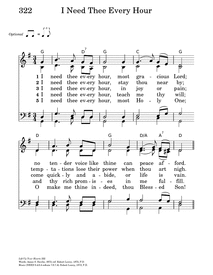
9) What feedback structures do you utilise in improving on your preaching?
We have a number of congregations at St Ebbe’s and a number of preachers, so we don’t always hear each other preaching live. The preachers meet once a month, having all listened, either at church or online, to a particular sermon by one of us. That individual is not present when we have our discussion of his sermon. Preachers are sensitive and are inclined to listen to every single comment that’s made, which can leave us overwhelmed with the number of things that we feel we ought to change. We found it more helpful to agree together on the positive things we want to feed back and also on one major area in which we think this sermon could have been improved. Because we listen to each other quite regularly, we are able to focus on areas to work on which are typical for that preacher. Having decided what we want to say, we then invite the preacher back in and give feedback. It sounds frightening, but it is a really helpful process and we all know that what is said has been carefully considered by a group of others and is not a maverick opinion of one.
10) What areas are you currently seeking to develop in your preaching?
There are so many different elements to a good sermon. Good understanding of the text in its context and a focus on its thrust are fundamental, but there is so much more to do: clarity of structure and expression; connection with people in head, heart and cultural context; concrete application to real life; as well as communication that exalts God and appeals to people to respond to him and his gospel in ways that are appropriate to the text. In any given moment I feel especially inadequate in at least one of these ways and try to give more attention to it, without losing the focus on correctly handling God’s word. I have recently been focusing on trying to think about how my preaching should differ depending on the genre of a passage. A sermon on The Song of Songs shouldn’t be exactly the same style as one on Ephesians.
11) What do you do on the days your preaching did not go very well?
There are times when I feel I need to be scraped off the floor after preaching because I have felt so inadequate. I try to encourage myself with the knowledge that this is God’s work and that the Holy Spirit graciously uses weak sermons. I have often been surprised how appreciative people have been about sermons that I have thought have been very bad, while those that seem from my perspective to go especially well appear to have no impact.
12) What one piece of advice would you pass on to someone starting out as a preacher?
Don’t get lost in the details.

Make sure you have a clear message – and work hard to ensure that it is the main message of the text. That thrust must come across, however long the sermon is and however many of the details you are able to expound as well. And the main thrust of the individual passage should always be preached in the light of the main thrust of the Bible as a whole. That will mean you always preach Christ and the gospel in every sermon, but in the rich variety of the Bible, rather than using the same old formula every time.
13) What are some of the best resources you have found on preaching?
Nothing has helped me more than Proclamation Trust preaching conferences. You may think that, as someone on the leadership team of PT, I would say that, but it’s genuinely true. They have not only helped me to have a deeper understanding of particular parts of the Bible, but also remind me of the importance of prioritising preaching and the need to keep working at it.
The Proclamation Trust runs 3 residential preaching conferences a year. Autumn Ministers’ Conference at the beginning of November and then Senior and Younger Ministers’ Conferences at the end of April and beginning of May. We would love to welcome you to one of these at Hothorpe Hall near Market Harborough. For more details please visit: https://www.proctrust.org.uk/conferences
———-
Vaughan has written a number of books, including God’s Big Picture, Battles Christians Face, True Friendship and, most recently, a series of three mini books addressing topical issues: Assisted Suicide, Transgender and The Porn Problem. In his spare time, Vaughan enjoys playing tennis and golf.
Proclaimer Blog
Wednesday is for Women’s Ministry (Part 2)

Carrie Sandom is the Director of Women’s Ministry at The Proclamation Trust. I asked her a few questions about Women’s Ministry.
Here is part 2 of our 4 part series, Wednesday is for Women’s Ministry.
Why should the church invest in Women’s Ministry?
They should invest in women’s ministry because un-taught and un-discipled women malign God’s Word (Titus 2:5). Paul is clear that while Titus and the teaching elders in Crete have an important role in teaching sound doctrine and refuting error, the younger women need to be taught and trained by godly older women as well. It’s not that they are needed to teach different things but they can model what it means to be a godly woman in ways the male teaching elders can’t. Teaching and training, mentoring and modelling are important aspects of effective discipleship – and men and women are needed to do them. We’re teaching the same things but sometimes they need to be modelled in different ways.
When should a church employ a Women’s Worker?
Whenever the resources are available to do so – although it doesn’t need to be a full time role in the first instance. One minister used to say that he would always employ a women’s worker before a youth or children’s worker because the investment made with the women would bear longer-term fruit – and impact the youth and children’s ministries as a result. It’s the parents who have the main responsibility for teaching their children so setting up discipleship programmes with them is the priority. Teach a mum how to study the Bible and she will teach it to her children – and demonstrate good parenting priorities as well.

What can a church do to enhance Women’s Ministry even if they do not have capacity to bring someone onto the staff team for this particular role?
Encourage women in their church to start women’s ministry – either by studying the Bible one to one or in small groups. Many churches have these already. If I was starting from scratch I would look for the women who are already serving in some way – either in the Sunday school or the youth group and so some sessions on leading better Bible studies or how to read the Bible one to one with someone. That said, the best way for women to learn is to experience a one to one or a good group study – so that may mean doing it with them for a term or two before letting them have a go with others.

What steps could be taken in a church where Women’s Ministry is stuck in a rut running studies about women in the Bible?
Hmm – I’ve come across ministries like this in other countries but hopefully we’ve moved on from this in the UK! Women’s ministry is not about being a woman! It’s about teaching the Bible to women and they need to hear the whole counsel of God. In our women’s Bible studies at St John’s we study a variety if different Biblical genres and seek to apply them in appropriate ways given the roles we have as women in the work place, in the home in our evangelism and so forth.
Proclaimer Blog
We Need You…

The Proclamation Trust has an urgent need for a receptionist to come and work in our busy central London office on Borough High Street, you will be the first point of contact for most enquiries – this is an exciting opportunity to join our team.
If you know anyone who could help us please pass on the details below.
The post is available immediately. For full details please visit, www.proctrust.org.uk/receptionist
The post is a maternity cover contract offered for a fixed term of 6 months.
It is a genuine occupational requirement that the office holder be in sympathy with the aims and beliefs of The Proclamation Trust.
The salary is £26,500.
Please send a CV and covering letter to pt@proctrust.org.uk ASAP.
Proclaimer Blog
Wednesday is for Women’s Ministry (Part 1)

Carrie Sandom is the Director of Women’s Ministry at The Proclamation Trust. I asked her a few questions about Women’s Ministry.
Here is part 1 of our 4 part series, Wednesday is for Women’s Ministry.
What is Women’s Ministry?
We’re aiming at the same things as men’s ministry – namely to proclaim Christ so women come to accept Him as Saviour and Lord and then to grow in their faith so they become spiritual mature. The Bible needs to be at the centre of all this – so women’s ministry is Word-filled ministry and not topic based! We want God’s Word to set the agenda and not bring our agenda to God’s Word.
What was your journey into women’s ministry?
I was converted as a teenager through the ministry of a good Bible teaching church, I went to uni and then trained as a Maths teacher. I was teaching in a secondary school in Cambridge, running the school CU and teaching 8-11s at my local church on a Sunday morning. The senior minister encouraged me to think about going to Bible College because he reckoned I enjoyed teaching the Bible as much as Algebra.

It took me 4 years to be persuaded that getting some theological training would be a good thing but I went to college thinking I would return to teaching afterwards. The Lord had other plans and I’ve been teaching women in local churches for the last 25 years.
Give us a flavour of what your week looks like at St. John’s Tunbridge Wells in your Women’s Ministry role.
I meet with women’s Bible study group leaders for a prep session every week so we’ve all had a chance to look at the passage that we will be teaching our groups the following week. We’re currently studying the second half of Mark’s gospel.

I’m also meeting up with a new Christian to read the Bible one to one and a non-Christian mum who did the Life Explored course last term and wanted to carry on meeting. We usually have a couple of women’s events each term – one for “in-reach” to build up Christians and one for “out-reach” for them to bring their non-Christian friends to, so I’m also preparing an evangelistic talk on the wide and narrow gates from Mathew 7 – after I’m hoping to run Christianity Explored with one of the mums so that she can run it with someone else next time. I’m also responsible for our senior members programme and enjoy meeting with them on Monday afternoons for some prayers, a Bible talk or testimony, with time to chat over tea and cake.
The Women in Ministry Conference run by PT has grown significantly over the last decade. Give us a flavour of what this conference looks like and seeks to do and how you would like to see it develop further in the coming years.
This conference is for any women who have a regular Bible teaching role – whether full time, part time or in their spare time, whether they are on the staff or not, or paid or not! The women who come are involved in a range of different ministries – women’s ministry, international ministry, student ministry, schools ministry, youth ministry, children’s ministry and ministry to the elderly. What we all have in common is a love for the Lord Jesus and a desire to teach the Bible faithfully.
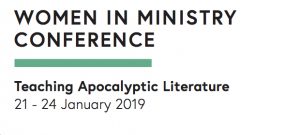
Each year we look at a different Biblical genre and have expositions on that genre from a couple of experienced Bible teachers (usually one man and one woman), workshop groups where we all teach a short passage on that genre to each other and then get constructive feedback from each other and a choice of seminar streams. But outside of the main sessions there are loads of opportunities to talk and share and pray together.
The friendships I’ve developed with people who are in similar ministry contexts to me have been hugely important over the years and the conference provides a way of deepening those friendships as well as making new ones. It’s not all work however and we laugh a lot, particularly over meal times where we get to enjoy someone else’s cooking for a change and don’t even have to do the washing up!
The 2019 Women in Ministry Conference is 21st-24th January at Hothorpe Hall, near Market Harborough. The subject is Apocalyptic Literature and the main speakers are Nigel Styles and Andrea Trevenna.
Proclaimer Blog
Preachers Profile: Melvin Tinker
This is the third in our Preachers Profile Series. This time we asked Melvin Tinker questions about his life and preaching ministry.

 Melvin is the vicar of St. John, Newland in Hull. He has been the vicar there for 23 years. Melvin is married to Heather and they have three grow up sons and nine grandchildren. Melvin enjoys walking and films. Melvin has also authored a number of books.
Melvin is the vicar of St. John, Newland in Hull. He has been the vicar there for 23 years. Melvin is married to Heather and they have three grow up sons and nine grandchildren. Melvin enjoys walking and films. Melvin has also authored a number of books.
We asked Melvin about life and ministry.
When did you preach your first sermon and how long have you been preaching?
When I was a student of 18 (44 years ago!!!) at an evangelistic event held by the CU.
What was your journey to preaching ministry?
Mainly while at university I was given opportunities to preach which began to create within me a desire to serve God in this way. After a short career in teaching, I went to train for the ordained ministry. I certainly would say that the work of PT in the 1980’s under Dick Lucas had a very significant effect in shaping my preaching (for the better I hope!).
Describe the congregation/setting you regularly preach to.
St Johns is a large multi-cultural congregation. It is made up of people from all ages, all walks of life, social groupings and different nationalities. It is the most mixed congregation I know. I minister in the most unchurched city in the UK (less than 0.7%).

What are you currently preaching on/through?
In the mornings a series on John’s Gospel; in the evenings The Apostle’s Creed- the beliefs dealt with expositionally by looking at a particular passage which deals with the article of faith.
What is your regular rhythm of sermon preparation, your usual process and how you schedule it in during the week?
I am usually thinking and praying ahead on the passage to be preached in a week or two’s time, mulling the passage over, thinking of relevant material. Then down to work usually Tuesday morning and using most mornings for preparation (that is when I work best). I will look at the passage and different translations; make notes regarding important features, maybe an outline will be developed as a go through the passage. I will then consult commentaries. Once the main substance of the sermon has been forged I will then note useful illustrations, references and how the text is to engage the congregation- always having a picture of the congregation in my mind as I prepare.
What is your drafting/editing process that you go through in finalising your sermon for Sunday?
Once the sermon has been drafted (I use full text) I then edit, mainly trying to cut it down to a manageable size, noting how to deliver different parts of the sermon, what effect I hope it will have on the hearers. I am keen to ensure that engagement/application takes place throughout the sermon. I give a fair amount of time in crafting a good introduction and conclusion.

What script/notes do you take into the pulpit?
I use full script. This is crucial to ensure that everything that needs to be said is said, there is discipline in delivery (avoiding waffle and going off point)-but I ensure that I am very familiar with the sermon, it is preached, not read.
What is your routine before preaching on a Sunday?
If I am preaching in the morning then before breakfast I go through the sermon, making last minute alterations and spend time in prayer.
What feedback structures do you utilise in improving on your preaching?
There are no formal structures. My wife remains my best critic and friend. But I have other staff members who are willing to give feedback, and we occasionally carve out time to do this in staff meetings of the ministers.
What areas are you currently seeking to develop in your preaching?
Nothing in particular. I am continually challenged and inspired by the preaching of my colleagues – we hold each other to a high standard.
What do you do on the days your preaching did not go very well?
Reading Spurgeon’s talk ‘The Preachers fainting fits’ is good – prayer, reflection and a determination to do better next time by God’s grace.
What one piece of advice would you pass on to someone starting out as a preacher?
Avoid trying to cover too much in one sermon; walk before you can run, work within your limits. Be yourself and don’t try to imitate others (but do emulate good preachers).
What are some of the best resources you have found on preaching?
Lloyd Jones ‘Preaching and Preachers’; Spurgeon’s ‘Lectures to my students’; Stott ‘I Believe in preaching’; Piper, ‘The Sovereignty of God in Preaching’.
Proclaimer Blog
Tumbling Sky – [Matt Searles]
This short new devotional book on the Psalms from Matt Searles is wonderfully honest, biblically potent and deeply pastoral.
It is not triumphalist superficiality to ‘propel’ you into your day, but 34 devotions rooted in reality where the full gambit of human experience is acknowledged. These devotions constantly nudge the reader to take a wider, longer view of present trials in light of the sovereign and faithful God revealed in his Word.
There is an accompanying album which ponders and portrays similar themes. The two together make for a very enriching devotional experience.
The real strength of the book is the pace at which Matt guides the reader gently through the verses in question. It is meticulous without being monotonous, incisive without being exhaustive. In an age where so much devotional material is about breadth, covering great chunks of material in as few sittings as possible, the relaxed and reflective style in Tumbling Sky is deeply refreshing to the soul.
There is also the advantage of each devotion having one resonant and overarching idea that sticks and reverberates throughout the day. These daily devotions are digestible, a couple of pages each (including the text) meaning that people in the depths of the experiences described are given every chance of benefiting from their counsel. There is also an incremental ascent in these devotions, almost imperceptible at the beginning but by devotion 34 you look back as on a mountain trek and marvel at how far you have come as you peer back to the valley below.

Particular highlights for me were the 4 devotions in Psalm 13 and the 3 devotions in Psalm 46. This book made me pause for thought and ruminate on the richness and realness of the language.
I would definitely recommend this book to someone who had grown a bit stale in their devotional life, it is a different kind of devotion to most, slow and saturated.It is also particularly pertinent to people in the midst of trials, struggles, doubts and despair. It is very real and pastorally very sensitive and helpful.
 I think Matt through experience has written a real gem in this beautiful little volume.
I think Matt through experience has written a real gem in this beautiful little volume.
Useful for: Anyone who wants a refreshingly honest devotional. Particularly those struggling (a great present).
Reading level: Very accessible and easy to read.
Price: RRP £7.99
ISBN: 9781911272861
Publisher: 10Publishing
Rating: *****
Proclaimer Blog
The adventures of Carrie Sandom [PT Director of Women’s Ministry]
From 8-13 Nov Carrie Sandom (Director of Women’s Ministry) will be in Dubai leading a Workshop on Biblical Exposition (WBE) in partnership with the Charles Simeon Trust.
Women from 20+ different countries who are living/working in the UAE will be attending the workshop on Titus that is being hosted by John and Keri Folmar of the International Christian Church (ICC) in Dubai.

The key components of the of the conference are sessions on Principles of Exposition, model expositions from the leadership team and practical workshops. Each delegate has been asked to prepare a short talk on a passage from Titus and during the four day conference will present it to their small group. The leaders of each group will then give them feedback so everyone can learn how to better handle God’s Word.

This tried and tested formula has been the bedrock of PT conferences for many years and Carrie’s leadership of the Women in Ministry conference (22-25 Jan 2018) provides women in the UK who are regularly teaching the Bible (whether to women, students, youth or children) with a similar training opportunity.
The Charles Simen Trust have been running WBEs for regular and occasional preachers in the UAE for some years and this is now the second workshop for women. Many of the ex-pats are only there for 3-5 years and will then move on to major cities all over the world. We hope the Bible handling skills the women develop and hone on this conference will equip them for ministry with women in small groups and 1-1s for years to come.

Please pray for Carrie as she travels and serves in Dubai. Pray for great fellowship, real sharpening and much fruit from this key conference.
Proclaimer Blog
Preacher’s Profile: Paul Rees
This is the second post in our Preacher’s Profile Series. This time we asked Paul Rees questions about his life and preaching ministry.
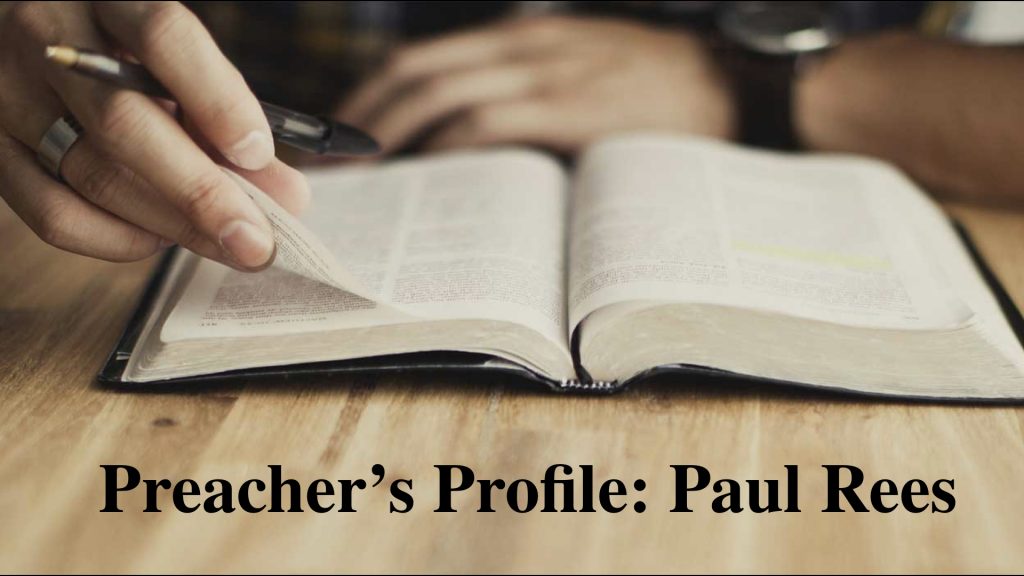
 Paul is the Lead Pastor of Charlotte Chapel in the city centre of Edinburgh. Paul is marries to Shiona and they have four children (3 at Uni and 1 at High School.
Paul is the Lead Pastor of Charlotte Chapel in the city centre of Edinburgh. Paul is marries to Shiona and they have four children (3 at Uni and 1 at High School.
We asked Paul some questions about his life and preaching ministry.
When did you preach your first sermon and how long have you been preaching?
1991 in Dundee – Halfway through preaching the sermon I realised as I preached that I did not really understand the Bible passage I was preaching on. Some kind older people still said it was nice to see a young man in the pulpit.
What was your journey to preaching ministry?
Hearing consistent expository preaching as a student whilst attending St Helen’s Bishopsgate, London 1986-1990.
Being asked to preach in Brethren churches.
Studying at Cornhill Course, London 1993-1994
Working part time as a dentist, self-financing ministry in my home church; during which several churches invited me to work for them full time.
Studying at Moore Theological College, Sydney. Working in student ministry with Simon Manchester (North Sydney) and John Chapman/David Mansfield (department of evangelism).
Describe the congregation/setting you regularly preach to.
Charlotte Chapel -is a gathered city centre church affiliated with the FIEC. Founded in 1808. A multi-generational church with a strong student and international’s ministry.

What are you currently preaching on/through?
About to start a series on the book of Hebrews – helped by attending the Spring Ministers Conference with Doug Moo on the book.

What is your regular rhythm of sermon preparation, your usual process and how you schedule it in during the week?
Monday – day off.
Tuesday – am – Pray & start text work.
Wednesday -am Pray and commentaries
Thursday – Pray & sermon outline am
Friday – pray & write sermon – all day; and sometimes Saturday if prep has not gone well.
Sunday AM – some reshaping if fresh ideas have come, pray & preach.
What is your drafting/editing process that you go through in finalising your sermon for Sunday?
It’s never finished – but just need to get up and preach what you have got; a better outline sometimes comes to mind the Monday afterwards!
What script/notes do you take into the pulpit?
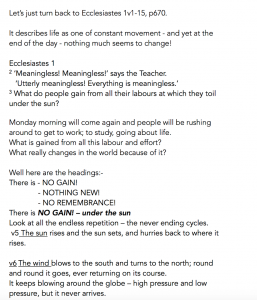
What feedback structures do you utilise in improving on your preaching?
Staff feedback time Tuesday afternoon staff time – was the bible understood correctly; what was helpful; what could be improved.
What areas are you currently seeking to develop in your preaching?
Starting earlier – in order to feel less anxious as the Sunday deadline approaches.
What do you do on the days your preaching did not go very well?
Same as when it seems to go well – spend Monday with my wife Shiona; walking the dog, going for a cycle, relaxing.

What one piece of advice would you pass on to someone starting out as a preacher?
Be a faithful herald of what God says in his Word and then its not about you. Spend time listening to your congregation and with young Christians and prepare so as to apply and be a blessing to them.
What are some of the best resources you have found on preaching?
I think my year at Cornhill – gave me tools and an approach that has largely shaped my preaching and then having older preachers mentor you and give you honest feedback is a great help.
Finding a good commentary on the bible book you are preaching through is a massive blessing.
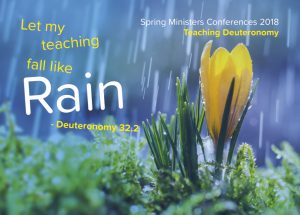
Doug Moo spoke on Hebrews at our Spring Ministers Conferences in 2017.
This year we have Garry Millar speaking on Deuteronomy.
Senior Ministers 23-26 April
Younger Ministers 30 April – 3rd May



